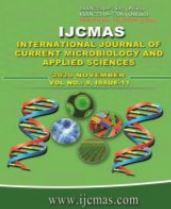


 National Academy of Agricultural Sciences (NAAS)
National Academy of Agricultural Sciences (NAAS)

|
PRINT ISSN : 2319-7692
Online ISSN : 2319-7706 Issues : 12 per year Publisher : Excellent Publishers Email : editorijcmas@gmail.com / submit@ijcmas.com Editor-in-chief: Dr.M.Prakash Index Copernicus ICV 2018: 95.39 NAAS RATING 2020: 5.38 |
The vegetable plays a vital role in the daily supplement of food. Frequency of the pesticide spray is higher in the vegetable crops. In order to optimize the use of pesticide and proper PPE usage Plant Health Engineering practices will help to overcome this. The present study was conducted in the Thiruparankundram and Alanganallur blocks of Madurai district of Tamil Nadu with 120 respondents. A well constructed Interview schedule was used to collect data. The findings reported that vegetable growers had medium level of awareness (70.8 per cent) about the plant health engineering practices. But most of the vegetable growers were not aware about the effect of pesticide on the field. Lack of awareness about the toxicity labels, measuring device for pesticide quantity, recommended chemical for pest and diseases in brinjal and tomato, nozzles and calibration of the sprayer should be well educated to the farmers through the KVKs , NGOs and Agricultural departments. It is well known that the year 2020 was proclaimed by the United Nations General Assembly as the International Year of Plant Health (IYPH). The year offers a once-in-a-lifetime opportunity to raise global awareness of how plant health security can help end hunger, alleviate poverty, protect the environment, and boost economic growth. Plant health is increasingly under threat. Climate change and human activities have altered ecosystems, reducing biodiversity and creating new niches where pests can thrive. At the same time, international travel and trade, which have tripled in volume in the last decade, can quickly spread pests and diseases around the world, causing great damage to native plants and the environment. It is much more cost-effective to protect plants from pests and diseases than to deal with full-blown plant health emergencies. To prevent the devastating effect of pests and diseases on agriculture, livelihoods and food security, prevention is crucial and all of us have a role to play.
 |
 |
 |
 |
 |